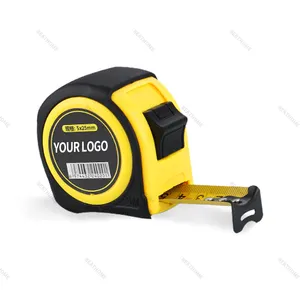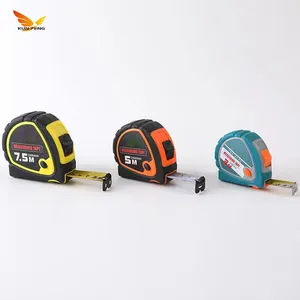
Wholesale Durable Using 5m/7.5m/10m Custom Measuring Digit Tape Inches Length Measurement Meter Digital Tape Measuring





















Steel tape measures are indispensable tools in precision tasks ranging from construction to home improvement. These tools are typically composed of a strip of steel that can be extended and retracted with ease, ensuring durability and accuracy for various measuring tasks. The steel tape is often encased in a protective shell, which can withstand the rigors of the job site.
The variety of steel measuring tapes caters to different measurement requirements. For instance, a steel tape measure 100 feet is designed for extensive outdoor projects, providing ample length for large-scale measurements. In contrast, a 30m steel tape measure offers a metric alternative for users who operate within the metric system. For those in the surveying field, a steel tape for surveying is specifically tailored to ensure precision and durability in outdoor conditions.
A stainless steel tape measure is known for its resistance to rust and corrosion, making it a reliable choice for environments exposed to moisture. The steel tape rule is another variant that combines rigidity and flexibility, allowing for straight-edge use and accurate measurement. Digital options, such as those with an electronic LCD, provide an alternative to traditional steel tapes, offering convenience and readability.
The applications of steel tape measures are vast. A 50 meter steel measuring tape is commonly used in fields requiring extended reach without sacrificing precision. The steel surveyors tape is a staple in land surveying, thanks to its robustness and accuracy over long distances. The advantage of using a steel measuring tape 50m is its ability to provide reliable measurements in a variety of settings, from construction sites to design studios.
Selecting the right steel tape measure depends on the user's specific needs. For example, a 50m metal tape measure is suitable for projects that require measurements beyond the standard tape length. Meanwhile, a stainless tape measure is ideal for those working in humid or marine environments. It is important to consider the tape's durability, readability, and additional features such as locking mechanisms or magnetic hooks.
To ensure longevity, proper maintenance of a steel tape used in surveying or construction is crucial. Keeping the tape clean and dry, as well as storing it properly when not in use, can prevent damage and maintain accuracy. Regular checks for wear and tear are also recommended to ensure the tape measure provides consistent service over time.